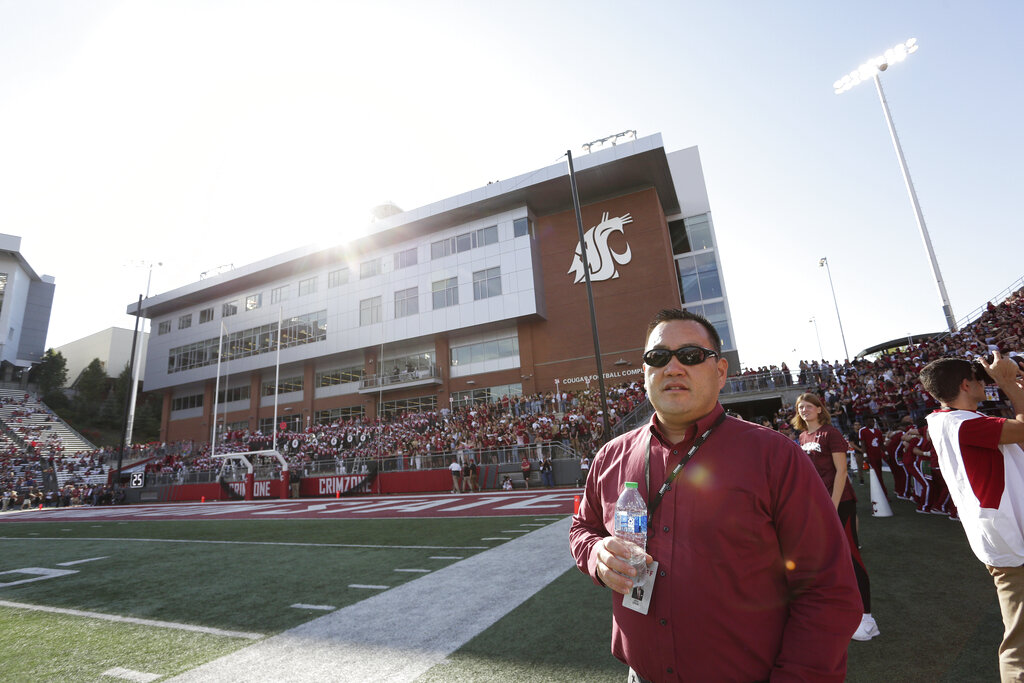WASHINGTON — As March Madness nears its conclusion, House lawmakers on Wednesday turned their attention to a different kind of collegiate chaos: the nascent billion-dollar industry of college athlete endorsement deals.
In the first hearing on Capitol Hill since a 2021 Supreme Court ruling gave collegiate athletes the right to profit from the use of their name, image and likeness — known as “NIL” rights — a panel of six witnesses mostly agreed Congress needs to set national standards for the booming industry. Without such guardrails, the influx of money “threatens to cause irreparable damage to the student-athlete experience,” Washington State University Athletic Director Pat Chun told a subcommittee of the House Energy and Commerce Committee.
“Unfortunately, the Supreme Court’s ruling did not offer clear rules of the road,” said Rep. Cathy McMorris Rodgers, a Spokane Republican who chairs the full committee. “The current NIL chaos means student-athletes are left to fend for themselves, and those at the top of their game must figure out how to maneuver through a multitude of agents, collectives and high-dollar contract offers all while maintaining their academic and athletic commitments.”
The absence of federal guardrails has made for a Wild West of endorsement deals, where college athletes are subject to confusing rules and vulnerable to predatory agents.
More than half of the nation’s states have enacted different laws governing NIL rights, while others — including Washington and Idaho — have none. That hasn’t kept athletes like Gonzaga basketball stars Drew Timme and Julian Strawther from inking endorsement deals with Pringles, Crocs and other companies.
While comprehensive data on NIL deals is scarce — another reason lawmakers on the panel called for congressional action — the endorsement platform Opendorse estimates the college NIL industry will be worth $1.14 billion in its second full year. Coincidentally, that’s roughly the same amount as the revenue earned in 2022 by the National Collegiate Athletic Association, or NCAA.
From July 2021 through February 2023, football and basketball have accounted for the overwhelming majority of NIL dollars, according to Opendorse data — 55.1% to football, 20.6% to men’s basketball and 10.2% to women’s basketball. The biggest chunk of that money — nearly 40% — has been spent on social media posts. Athletes in NCAA Division I earned an average of $4,141 each, compared to just $382 for Division II athletes.
While the issue of NIL rights is not deeply partisan — the panel’s Republican and Democratic members traded more jabs over their favorite college teams than over policy differences — lawmakers have nevertheless failed to act on the issue for years. Wednesday’s hearing was the first in Congress since June 2021, when Gonzaga men’s basketball coach Mark Few called for a federal NIL law before a committee led by Sen. Maria Cantwell, D-Wash.
Days after that previous hearing, the Supreme Court ruled unanimously that the NCAA’s restrictions on “education-related benefits” violated federal antitrust law, a relatively narrow decision that paved the way for NIL payments without establishing guidelines for the practice.
Rep. Russ Fulcher, a Republican who represents North Idaho, asked Florida State University softball player Kaley Mudge what she wished she would have known when that ruling came down nearly two years earlier.
“I wish that there would have been more federal legislation,” Mudge said. “The past two years, even though I’ve been able to capitalize on my NIL, it’s been very confusing and very — just hard to distinguish what deals I can do and can’t do.”
Chun said a federal law could also prevent “pay-for-play” deals to recruit athletes to a school with promises of endorsement money, which have reportedly been arranged by “collectives” formed by alumni. While forbidden, such arrangements are difficult to prevent under current law, he said.
“True NIL is extraordinarily positive for our student athletes,” Chun said. “It’s what is going on with recruiting, inducements, with some of these collectives that is ultimately fraudulent.”
Hal Biagas, chief operating officer at Seven1 Sports & Entertainment Group, which represents Gonzaga star Drew Timme and other college athletes, said state laws as well as college conference rules provide a significant amount of oversight and transparency, but a federal law could be beneficial.
“It would bring a lot more clarity and uniformity to the situation,” he said in an interview.
Chun said a federal bill also could ensure fairer compensation for female athletes, who currently earn far less than their male counterparts, according to Opendorse data.
While most of the witnesses threw their support behind a federal bill to regulate college athlete pay, Jason Stahl, executive director of the College Football Players Association, pushed back.
“The federal government should stay out of the NIL free market,” Stahl said.
Stahl also expressed support for letting student-athletes unionize and share the revenue earned by universities and the NCAA, which other witnesses opposed because doing so could effectively turn students into employees of a university.
Despite the bipartisan agreement that Congress should act to set national standards for college athlete pay, there was no indication Wednesday that lawmakers are close to finalizing legislation that could become law in a divided Congress.



